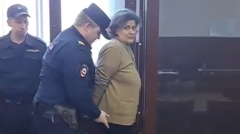A hairdresser from St Petersburg, Anna Alexandrova, has been sentenced to five years and two months for alleged anti-war comments on social media, amidst a backdrop of harsh crackdowns on dissent in Russia.**
St. Petersburg Hairdresser Sentenced for Alleged Anti-War Social Media Posts**

St. Petersburg Hairdresser Sentenced for Alleged Anti-War Social Media Posts**
Anna Alexandrova faces over five years in prison under Russia's controversial "fake news" law.**
A hairdresser from St Petersburg, Anna Alexandrova, has been sentenced to five years and two months in prison for allegedly spreading fake news about the Russian army on social media. Alexandrova, who has denied the accusations claiming the case arose from a land dispute with a neighbour, was convicted of posting eight anti-war messages online. Her neighbour had reported her to authorities after receiving images of the war in Ukraine sent by Alexandrova’s daughter.
Following Russia’s full-scale invasion of Ukraine in February 2022, the government intensified regulations against dissent, criminalizing actions labeled as discrediting the military. This has resulted in numerous arrests of critics and opponents, along with the suppression of independent journalism.
In a separate incident, four journalists were sentenced to five and a half years in jail in Moscow for their association with an "extremist organization." They insisted they were merely fulfilling their roles as journalists, but the court ruled that their work contributed to an anti-corruption group led by Alexei Navalny, a prominent critic of President Vladimir Putin, who died in custody.
Alexandrova, a 47-year-old mother, was taken into custody in November 2023 for her posts shared through two anonymous accounts on the Russian social network VKontakte. Her case was initially a mundane local issue regarding land, but it escalated when accusations of fake news emerged. Legal experts have raised concerns about the implications of such laws, arguing they are used to suppress freedom of speech and punish dissenting views.
In another related case, Alexei Gorinov, a Moscow council member, received the first full sentence under the "fake news" law in July 2022 for his critical statements about the war during an official meeting. His sentence was extended by three years after further criticism while in prison. Lawyers representing Gorinov contend that the "fake news" legislation stifles truthful information, rebuking the government's justification of maintaining public order as a guise for suppressing dissent.




















